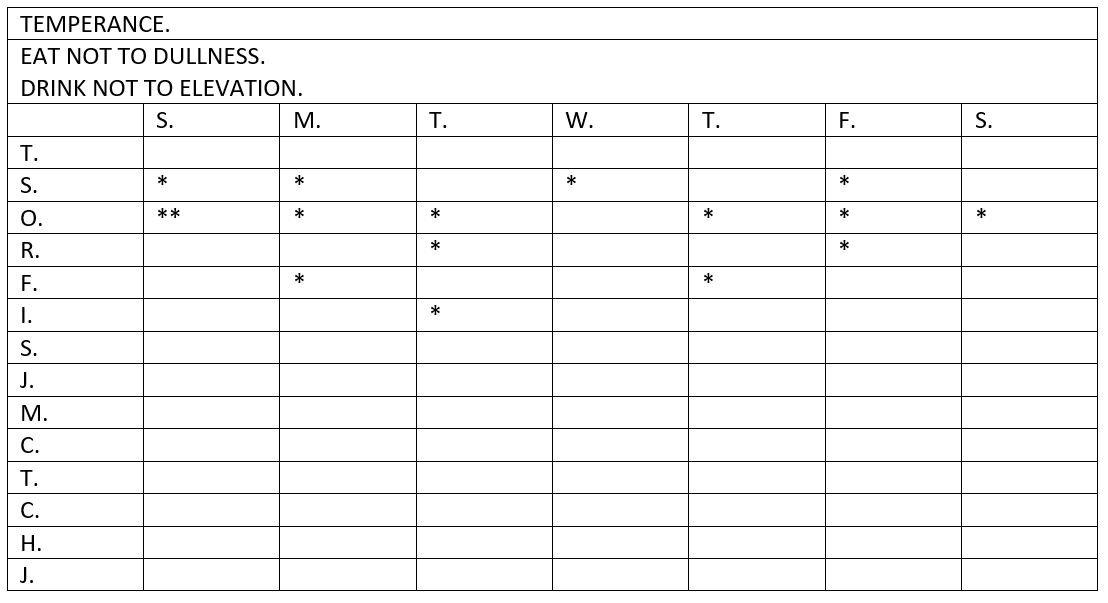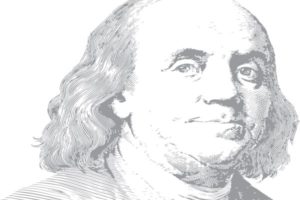This is How Ben Franklin Used the 13 Virtues in His Life
When most of us think of Benjamin Franklin, self-improvement is probably not what first comes to mind. Instead, some of his accomplishments and projects that come to mind are how this Founding Father helped unite the colonies or how he flew a kite in a storm. Or perhaps we remember that he published newspapers and co-founded many organizations including the University of Pennsylvania. Or maybe his accomplishments as a scientist, politician, humorist or civic activist are what come to mind.
However, as impressive as all of that (and more) is, I think the project that is most inspiring to me is one that he undertook on himself!

One of His Most Ambitious Projects Ever!
At the age of 20, Franklin set out to achieve the ambitious and unrealistic goal of moral perfection.
As he says in his autobiography, The Autobiography of Benjamin Franklin:
“It was about this time that I conceived the bold and arduous project of arriving at moral perfection. I wish’d to live without committing at any fault at any time; I would conquer all that either natural inclination, custom, or company might lead me into.” 1
He quickly realized that this project would be no easy task!
“But I soon found I had undertaken a task of more difficulty than I had imagined. While my care was employ’d in guarding against one fault, I was often surprised by another; habit took the advantage of inattention; inclination was sometimes too strong for reason.” 1
The Problem Was That…
…as he said:
“..that the mere speculative conviction that it was our interest to be completely virtuous, was not sufficient to prevent our slipping; and that the contrary habits must be broken, and good ones acquired and established, before we can have any dependence on a steady uniform rectitude of conduct.” 1
In other words, just thinking about living a life of moral perfection was not enough, he needed a process and a plan to ensure that he was creating good habits and breaking bad habits that would lead to his desired life.
The First Part of Franklin’s Plan
The first part of his plan was to identify a list of moral virtues that he wanted to live his life by. Through his reading, he found that most writers defined certain virtues using many words, which just made things confusing. For example, some defined temperance with respect to eating and drinking, while others defined it “to mean the moderating of every other pleasure, appetite, inclination, or passion, bodily or mental, even to our avarice and ambition.”
So, instead, he created 13 virtues, each with a short description which succinctly expressed the meaning which he had given it.
Those 13 virtues and their brief descriptions are as follows:
Ben Franklin’s 13 Virtues
(1) Temperance
Eat not to dullness; drink not to elevation
(2) Silence
Speak not but what may benefit others or yourself; avoid trifling conversation.
(3) Order
Let all your things have their places; let each part of your business have its time.
(4) Resolution
Resolve to perform what you ought; perform without fail what you resolve.
(5) Frugality
Make no expense but to do good to others or yourself; i.e., waste nothing.
(6) Industry
Lose no time; be always employ’d in something useful; cut off all unnecessary actions.
(7) Sincerity
Use no hurtful deceit; think innocently and justly, and, if you speak, speak accordingly.
(8) Justice
Wrong none by doing injuries, or omitting the benefits that are your duty.
(9) Moderation
Avoid extremes; forbear resenting injuries so much as you think they deserve.
(10) Cleanliness
Tolerate no uncleanliness in body, cloaths, or habitation.
(11) Tranquility
Be not disturbed at trifles, or at accidents common or unavoidable.
(12) Chastity
Rarely use venery but for health or offspring, never to dullness, weakness, or the injury of your own or another’s peace or reputation.
(13) Humility
Imitate Jesus and Socrates.
The Second Part of Franklin’s Plan
After creating the list of virtues, Franklin did something really smart.
Understanding that while he wanted to acquire the habits of all 13 virtues, he also realized he couldn’t do them all at once.
So, he decided to divide and conquer and as he said:
“fix it on one of them at a time; and, when I should be master of that, then to proceed to another, and so on, til I should have gone thro’ the thirteen; and, as the previous acquisition of certain others, I arrang’d them with that view, as they stand above.” 1
His method had him create a little book which had a page dedicated to each of the virtues as you see below for the habit of temperance.
 He had a column for each day of the week and each row was represented by the first letter of each of the 13 virtues.
He had a column for each day of the week and each row was represented by the first letter of each of the 13 virtues.
Then, Each Week He Would Focus on One of the 13 Virtues
For example, he focused on temperance the first week as seen above. The idea was to guard against every opportunity to violate temperance for the whole week while leaving the other virtues to their ordinary chance.
Then at the end of the day, he would mark his faults of the day under each of the other virtues.
As he said: “Thus, if in the first week I could keep my first line, marked T, clear of spots, I suppos’d the habit of that virtue so much strengthen’d, and its opposite weaken’d, that I might venture extending my attention to include the next, and for the following week keep both lines clear of spots.” 1
Each week he would work on a new virtue while making sure to keep the previous ones free of spots. This meant that within 13 weeks he could get through all 13 virtues and then start all over again; meaning he could do it four times a year.

Giving to the Next Generation
I was fascinated that Franklin was self-aware enough that these 13 virtues would have an impact on generations to come. He elaborated on how some of the virtues had helped him and could help his descendants:
“To Temperance he ascribes his long-continued health, and what is still left to him of a good constitution; to Industry and Frugality, the early easiness of his circumstances and acquisition of his fortune, with all that knowledge that enabled him to be a useful citizen, and obtained for him some degree of reputation among the learned; and to Sincerity and Justice, the confidence of his country, and the honorable employs it conferred upon him; and to the joint influence of the whole mass of the virtues, even in the imperfect state he was able to acquire them, all that evenness of temper, and that cheerfulness in conversation, which makes his company still sought for, and agreeable even to his younger acquaintance. I hope, therefore, that some of my descendants may follow the example and reap the benefit.” 1
While He Never Achieved Moral Perfection, He Did Improve!
As he said:
“In truth, I found myself incorrigible with respect to Order; and now I am grown old, and my memory bad, I feel very sensibly the want of it. But, on the whole, tho’ I never arrived at the perfection I had been so ambitious of obtaining, but fell far short of it, yet I was by the endeavor, a better and a happier man than I otherwise should have been if I had not attempted it; as those who aim at perfect writing by imitating the engraved copies, tho’ they never reach the wish’d for excellence of those copies, their hand is mended by the endeavor, and is tolerable while it continues fair and legible.” 1
And really that is the main lesson in today’s post. As we said in a previous post, perfection simply doesn’t exist, but the endeavor as Franklin said will make you a better and happier person. In other words, it is all about the journey and trying to improve every day, not the destination!
When Doing Some Research on Franklin, I Found a Good Example…
…of how he had a hard time perfecting his temperance.
Evidently, Franklin did consume a little alcohol now and then. In one amusing exchange, Ben had a little debate with his own gout, which was a malady that plagued him for much of his life.
Clearly, in pain, he wrote, “What have I done to merit these cruel sufferings?”
To which Gout smugly replied, “Many things; you have ate and drank too freely…”
Another entertaining anecdote on Franklin was that not only did he know how to drink but that he knew how to identify those who knew how to drink. You see, in the January 13, 1737 edition of the Pennsylvania Gazette, he published a list of 200 synonyms for the word drunk in an essay called the “Drinkers Dictionary”.
A few of my favorites:
“He’s had a Thump over the Head with Sampson’s Jawbone”
“Wamble Crop’d”
“Cock Ey’d”
“As Dizzy as a Goose”
Your Challenge for Today…
…is to see if you can go a full day without giving yourself a mark for one of the 13 moral virtues that you are struggling with!
Well, on that note, it is time for this blogger to go grab some drinks with a friend, I”ll try not to get too “Topsy Turvey”!
Until next time, keep practicing the 13 moral virtues, and as always…PYMFP!
–Rick
P.S. Wanna know more? Check out the entire book.
What Do You Think?
What did you think of today’s post on Franklin’s 13 virtues? Please share your thoughts in the comments below!
If you enjoyed this post, it would mean the world to us if you shared it with people you care about via any of the social media platforms below!
Popular Previous Posts:
Bruce Lee Quotes: 11 of His Most Inspiring and Powerful!
Asking for Help: Why it Sucks and How to Do it Better!
How to Overcome Perfectionism aka Man’s Ultimate Illusion
Help, I’m Stuck! 19 Ways for Getting Unstuck from a Problem
References
1 The Autobiography of Benjamin Franklin by Benjamin Franklin
https://www.bartleby.com/109/3.html
http://www.openculture.com/2014/10/ben-franklins-200-synonyms-for-drunk.html

The idea that he felt happier in trying to be virtuous is the key. It was an honourable goal. Whatever our objective is , we often feel happier when we make strides towards the achievement of our goal. Thanks Rick
Hi Eileen, I agree that focusing on the process and not getting hung up on the end result is key. Best, Rick
Franklin was one of those guys who dabbled in, and wrote about, everything. He had no choice, as a newspaper publisher he needed material to fill up the pages. It sure helped circulation to be controversial or risque at times. Keeping this to a minimum, as he could not insult his Quaker readers in Philadelphia, he tread a fine line between news, philosophy, and outright BS. I like to think that today he would be publisher for the National Enquirer, or maybe a British tabloid.
Items (1) and (12) seem totally out of place in today’s world. And of course, you know my opinion regarding journal writing. So in my best Franklin style, I give you……
“That’s what”
— She
Hi Dave, LOL…too funny on the National Enquirer. Yeah it’s amazing how our thoughts on some of the virtues have changed over time, I suppose that’s just progress. Take care, Rick